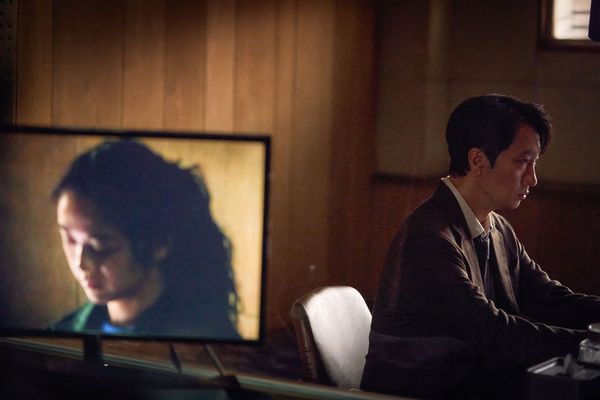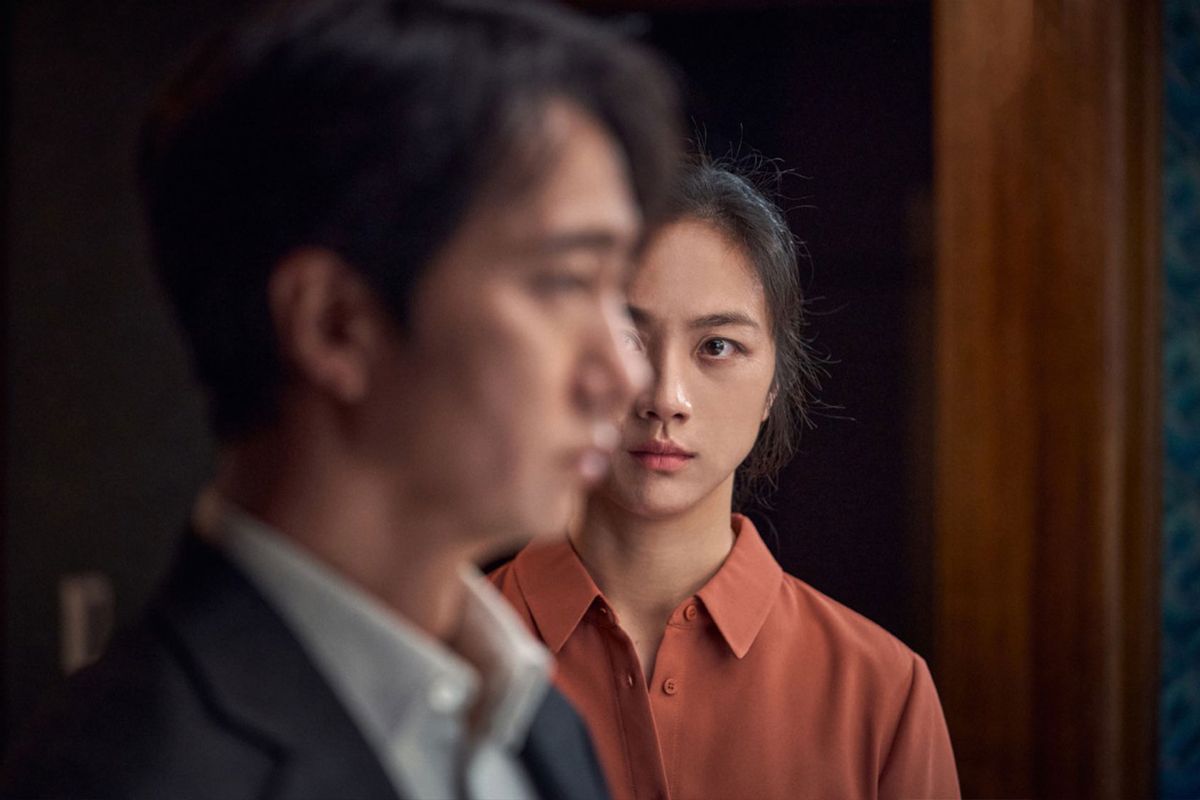Park Chan-wook ("Stoker") justly won Best Director at Cannes this year for his mesmerizing romantic thriller, "Decision to Leave." What starts out as a typical detective drama, soon becomes an involving tale of amour fou as a police investigation shifts from the professional to the personal.
The story begins with the death of Ki Do-soo, who lies at the base of a mountain he climbed. (There is a fantastic shot, from the deceased's point of view, of an ant crawling on his face). Hae-joon (Park Hae-il), the Busan police force's youngest inspector, is assigned to investigate, and he has to determine if Do-soo fell, died by suicide or was murdered. There are DNA traces found under Do-soo's fingernails, which prompts Hae-joon to question the victim's enigmatic widow, Seo-rae (Tang Wei, of "Lust, Caution"), a Chinese woman whose Korean is "insufficient." At times, Seo-rae laughs when she has "no confidence" in Korean, a trait that actually charms Hae-joon.
Seo-rae also occasionally records her remarks in Chinese for translation in Korean. There is a wonderful moment, later in the film, where Hae-joon overhears Seo-rae talking to a cat in Chinese and asks the animal to "Bring me the head of that kind detective." When Hae-joon asks her about this, she claims he misheard; she said, "heart," not "head." Such is the dreamy seduction going on between suspect and inspector.
Hae-joon falls under Seo-rae's spell almost as soon as he starts to surveil her. He stakes her out at her job working as a caregiver for an elderly woman. The scene is shot brilliantly, playfully, with Hae-joon, leaning in closer with his binoculars from the driver's seat of his car as if to get a better view only to literally be positioned in the same room with Seo-rae. He watches her behavior, sniffs the air, and is "caught" by her when she looks at the camera.
When Seo-rae is brought in for questioning, she and Hae-joon talk and share a fancy sushi dinner. It feels more like a date than an interrogation. But as Hae-joon comes to accept if not downright believe her alibi, he also learns that Seo-rae has a dark incident in her past that doesn't help her case. Moreover, as they continue to meet, Hae-joon cooks for Seo-rae one night. Later, Seo-rae helps the inspector get some sleep — he suffers from insomnia. Hae-joon's interest in Seo-rae quickly crosses into the dangerous territory of attraction, and it is hard not to wonder: Is she playing him? "Decision to Leave" deliciously, and judiciously, never tips its hand.
 Decision to Leave (MUBI)
Decision to Leave (MUBI)
Adding another layer to the inappropriate behavior is the fact that Hae-joon is married. He has a "weekend relationship" with his wife (Lee Jung-hyun), who lives in Ipo. And during the couple's regular lovemaking, he thinks more about the investigation than his wife. (In another terrific visual, Hae-joon fixates on an x-ray during sex. The skeletal hand curls into a fist, morphing into the same movement Hae-joon is making in bed. The film is chock-full of such stylish images.)
"Decision to Leave" takes a slow-burn approach to Hae-joon and Seo-rae's game of cat-and-mouse, and the central narrative get interrupted from time to time. A subplot involving another investigation prompts an exciting high-speed foot chase that curiously features a voiceover history lesson about Seo-rae's grandfather, who fought Japanese colonizers in the 1930s. Another terrific sidebar, later in the film, has Hae-joon distracted and chasing after stolen soft-shell turtles, which generates an amusing sight gag.
Park Chan-wook is masterful when it comes to such layering, playing with viewer's expectations as various details are revealed. Is Seo-rae hiding something when she removes photographs from Hae-joon's cases and burns them? Is Hae-joon blinded by desire when he discovers what may be a critical piece of information that could implicate Seo-rae in murder? As Hae-joon studies Seo-rae, his obsession may be a case of his feeling sorry for her. What is more, it may be his undoing. In one of the film's most striking emotional moments, Hae-joon is "completely shattered" by what has transpired between him and Seo-rae.
Yet this pivotal episode happens around the film's midpoint. Park then cuts to 13 months later with Hae-joon is now living in Ipo with his wife. They eventually run into Seo-rae with her new husband, Im Ho-shin (Park Yong-woo) who have moved there. The two couples have a slightly awkward exchange. When Ho-shin dies — as evidenced by a gorgeous shot from below of blood in a pool — Seo-rae becomes a murder suspect yet again. Is she a black widow? How things play out will keep viewers on tenterhooks until the final moments.
"Decision to Leave" — the title refers to that moment when someone makes their mind up to end a relationship — plays up issues of truth and trust as Hae-joon and Seo-rae dance around their attraction. The ambiguity of what is really going on is what makes the film so tantalizing.
Want a daily wrap-up of all the news and commentary Salon has to offer? Subscribe to our morning newsletter, Crash Course.
The performances by Park Hae-il and Tang Wei are incredibly subtle; his hand on her face, or her hand on his, convey so much unspoken feeling, longing, and emotion. But it is also Park Chan-wook's stunning images that make the film so extraordinary. A fabulous shot of Seo-rae's face framed by Hae-Joon's crooked arm is a perfect metaphor for their relationship.
"Decision to Leave" is a stunning achievement that ends by deliberately raising more questions than it answers.
"Decision to Leave" opens in New York and Los Angeles on Oct. 14, expanding in theaters nationwide in the following weeks. It will be available later on MUBI. Watch a trailer via YouTube.



Shares